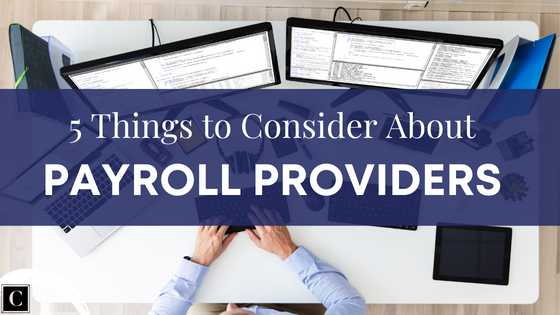
Your options when it comes to payroll are VAST! There are so many companies providing payroll services, that honestly, it is mind-boggling. Many of you may have gotten overwhelmed and just went with the first service offered to you without doing your research because of the abundance of choice.
But if it’s not working for you, below are some questions to ask yourself.
Make sure you are subscribed to our YouTube Channel so you don’t miss helpful videos discussing small business finance tips!
Here are some things Hannah Smolinski, CPA, covers in her video on this subject:
1. What services do you have now? And what would you like to have the system do in the future?
Providers are offering everything from the basics:
- Issuing paychecks and withholding taxes
- Filing federal and state returns
- Time tracking
- Managing benefit withholdings
To the more elaborate offerings:
- Brokering benefits
- Helping manage onboarding
- HR consulting services
- Document management
- Performance management systems
It’s important to look at what you have, and what you need. What is the minimum, and what’s “nice to have”?
2. When is the best time to do this?
I normally recommend a clean break in the accounting software at year-end or before year-end. This would mean the new payroll provider picks up right on January 1st of the new year ideally. Ask the new payroll provider about their recommendations for timing if this is not possible. Payroll companies will often have promotions at the end of the year, so be sure to take advantage of those offers if choosing to switch!
3. Will the system be able to scale with your needs?
Changing payroll providers is an administrative hassle. If you plan to change and grow a lot in the coming years, it may be good to see if the provider has services you might want to upgrade to in the future, even if you don’t have them now. If you are experiencing growth outside of your state or want to start adding benefits, it may be time to explore a PEO.
4. Price!
Clearly price is a factor in any software or service selection. Payroll is a SERVICE at the end of the day, and there are a lot of ways to accomplish the service. We recommend comparison shopping – make sure it is apples-to-apples though. If one service provider is saving your bookkeeper time by doing the tax filings for you, that is significant value. Or, if you can consolidate multiple services into one (i.e., hour tracking, HR support, and payroll) into a slightly higher-priced service, that could be a smart move.
Lastly, understand what to expect: is there monthly fee like Gusto or per payroll like Paychex and ADP? Ask if off-cycle payroll is more? What additional fees are charged? Something like a PEO might be more expensive, but it could save you money in other areas (i.e. 401k administration, internal admin costs, and insurance costs). It’s good to look at the total cost of payroll and benefits administration to do a true apples to apples comparison.
5. Customer Service
Payroll is complex by nature. Sometimes you will need help and talking to a human being will be important. Ask about the company’s customer support and ask around other business owners to see what people are saying about the provider before switching. Maybe a lower price is worth it to you to have less customer service. But, if you know you have complex payroll and have needed support in the past, it may be worth making this your #1 decision making factor.
Be sure to watch the full video here:
This blog post contains some links that are affiliate links for products we use and believe in. If you choose to use our links to make a purchase, we do receive a small payment from the software provider, and this helps our business grow. If you choose to sign up using one of our links, we thank you!
Disclaimer: This blog and the linked videos are intended for educational purposes and should not be taken as legal or tax advice. You should consult with your financial professionals about your unique financial situation before acting on anything discussed in these videos. Clara CFO Group, LLC is providing educational content to help small business owners become more aware of certain issues and topics, but we cannot give blanket advice to a broad audience.






